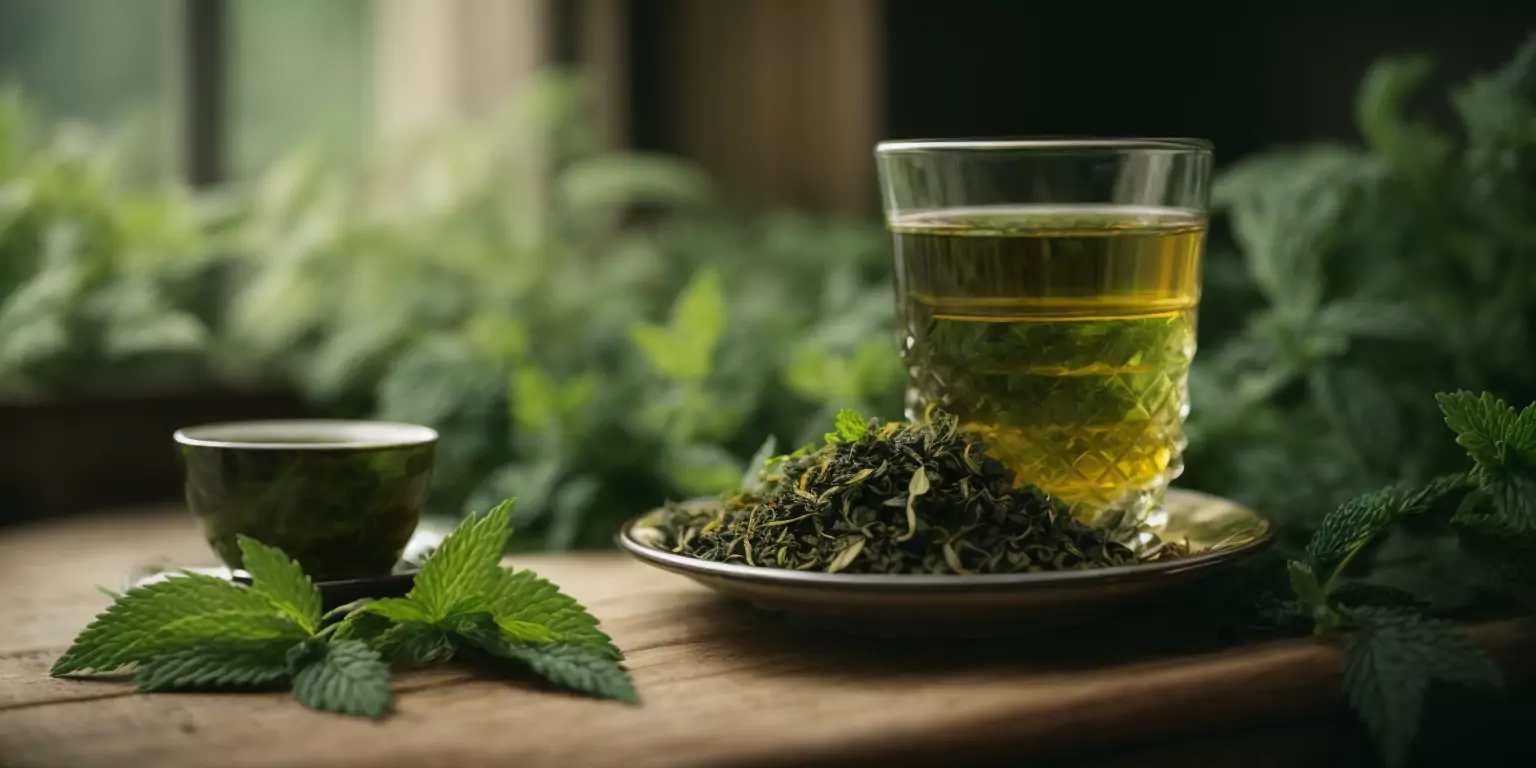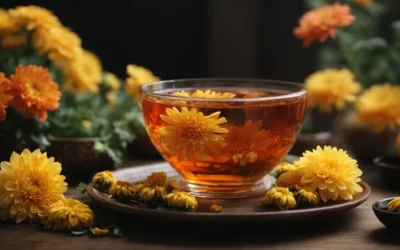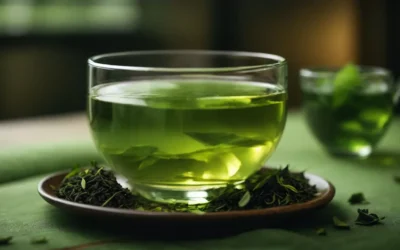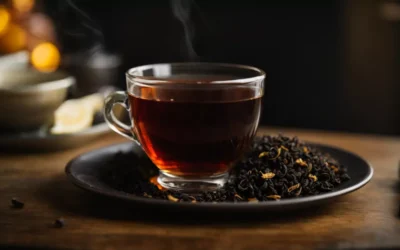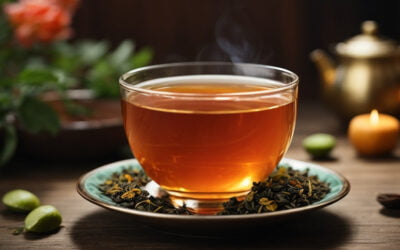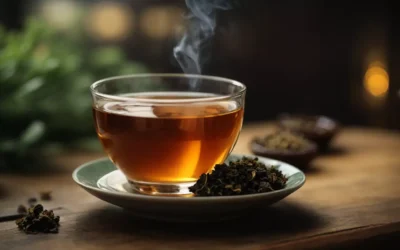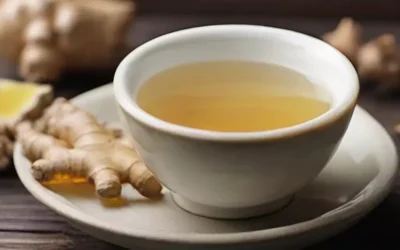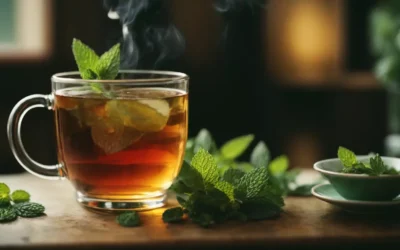Nettle tea, made from the leaves of the stinging nettle plant, is a popular herbal infusion in alternative medicine. It has a long history and is widely used as a natural diuretic, thanks to its root extracts. This traditional beverage, known as herbal tea, offers a multitude of potential health benefits that have captivated the interest of many who enjoy drinking nettle tea. The use of herbal teas in herbal medicine is well-known, making nettle tea a popular brew.
Nettle tea, a popular herbal tea, is known for its distinct flavor and earthy aroma. It has gained popularity in the world of herbal medicine due to its versatility and potential therapeutic properties. People brew nettle tea to enjoy its unique taste and benefit from its herbal properties. The leaves of the nettle plant are carefully harvested and dried to brew herbal teas, such as nettle leaf tea. It can be found in various forms like extracts, powders, and root preparations. Nettle leaf tea is known for its analgesic properties, providing relief from painful stings.
This infusion continues to intrigue and delight tea enthusiasts worldwide with its unique blend of nettle root extracts.
- Understanding Nettle 101
- Health Benefits of Nettle Tea
- Exploring the Flavor Profile of Nettle Tea
- Making Nettle Tea at Home
- Potential Side Effects and Interactions
- Special Considerations for Different Populations
- Nutritional Facts and Preparation Tips
- The Importance of Stinging Nettles in Health and Medicine
- Other Beneficial Alternatives
- Conclusion on the Wonders of Nettle Tea
- FAQs
Understanding Nettle 101
Stinging nettle, also known as Urtica dioica, is a perennial flowering plant that can be found in temperate regions across the globe. It is commonly used for its herbal teas made from the leaves. This plant is known for its ability to relieve pain and has been used in traditional medicine for centuries. It is native to North America, Europe, and Asia and is often used as a natural remedy for various ailments. Additionally, stinging nettle is also known to be beneficial for fish health. This remarkable nettle plant is recognized for its characteristic stinging hairs that can cause irritation upon contact. Whether you’re using fresh nettle leaves or nettle powder, it’s important to be cautious when handling this plant.
Stinging Nettle: A Perennial Wonder
Nettles are not your ordinary plants. Tea bags have been used for centuries due to their numerous medicinal properties, including their antioxidant effects. Nettle leaf and nettle extract are also commonly used for their medicinal benefits. From ancient times to modern-day herbal remedies, nettle leaf extract has played a significant role in traditional medicine practices for people with blood-related issues around the world.
A Global Presence
Nettles, with their broad leaves, are commonly found in many regions around the world. These plants have been known to have a positive impact on people’s health, as they contain a unique extract that can help improve blood circulation. Whether you’re exploring the forests of North America or wandering through European meadows, there’s a good chance you’ll stumble upon stinging nettle, also known as nettle leaf. Many people enjoy drinking nettle tea for its various health benefits. They even thrive in Asian countries like China and Japan, where people study their blood and extract valuable information.
The Sting Factor
One of the most intriguing aspects of stinging nettles is their ability to sting people. This study focuses on the stinging properties of the Urtica dioica leaf. The stinging nettle, also known as nettle leaf, has tiny hairs on its leaves and stems that contain chemicals. These chemicals can cause mild irritation when people come into contact with their skin. Drinking nettle tea is a popular way for people to enjoy the benefits of this plant. It’s like nature’s way of saying, “Watch out!”
Medicinal Marvels
Despite their prickly reputation, nettles offer an array of health benefits for people when prepared correctly. The leaf of the nettle is rich in protein and can be a great addition to one’s diet. Additionally, engaging in activities such as cooking or gardening with nettles can provide both physical and mental benefits. Nettle tea is one popular activity to harness its healing powers. Packed with vitamins and minerals such as iron, calcium, and vitamin C, nettle tea has been traditionally used to alleviate allergies, reduce inflammation, support urinary health, and promote overall well-being.
Nutritional Powerhouse
Nettles aren’t just good for your health; they’re also packed with essential nutrients. These stinging nettle leafy greens contain high levels of antioxidants that help protect your body against free radicals – harmful molecules that can contribute to various diseases.
Versatile Uses
Apart from being consumed as tea or cooked as a nutritious vegetable, nettles have a range of other practical uses. In some cultures, al nettle fibers are used to make fabric and rope. The nettle leaf can also be dried and ground into a powder to create a natural dye for textiles. Stinging nettle leaves are commonly used for this purpose.
A Word of Caution
While nettles offer numerous benefits, it’s important to exercise caution when handling al in their raw form due to their stinging properties. It’s best to wear gloves or use tongs when collecting fresh nettles to avoid any unwanted encounters with those prickly al hairs.
Nettles may be small plants, but they possess incredible potential. From their stinging nettle leaf hairs to their medicinal marvels and versatile uses, there’s no denying the unique qualities that make these plants so fascinating.
Health Benefits of Nettle Tea
Alleviates Seasonal Allergies
Nettle tea may be a natural remedy for those pesky seasonal allergies. Stinging nettle contains natural antihistamine properties that could help alleviate symptoms like sneezing, itching, and congestion. The nettle leaf is known for its potential to relieve these symptoms. By blocking the release of histamine in the body, nettle tea may provide relief from allergic reactions caused by pollen, dust mites, or pet dander.
Reduces Fluid Retention
If you’re struggling with fluid retention or bloating, nettle tea might be worth a try. Nettle tea is known for its ability to alleviate these symptoms and provide relief. So, if you’re experiencing discomfort from al, give nettle tea a shot. This herbal infusion, made with nettle leaf or stinging nettle, has potential diuretic effects. It can help your body eliminate excess water and reduce swelling. By promoting urine production, nettle tea may assist in flushing out toxins and maintaining urinary health.
Combats Oxidative Stress
Nettle tea is packed with antioxidants that can contribute to your overall well-being. Antioxidants, such as stinging nettle, protect our cells from damage caused by free radicals – unstable molecules that can lead to oxidative stress and various health problems. By consuming nettle tea regularly, you can provide your body with an extra dose of these powerful antioxidants to combat oxidative stress. Nettle tea is rich in antioxidants, including al, which help fight oxidative stress.
Nettle tea’s natural antihistamine properties make it a potential ally in providing relief from seasonal allergy symptoms such as sneezing and congestion. The diuretic effects of stinging nettle may help reduce fluid retention and promote urinary health by eliminating excess water from the body.
Moreover, nettle tea’s high antioxidant content makes it a valuable addition to your wellness routine. These stinging nettle antioxidants work hard to protect your cells from damage caused by harmful free radicals roaming around in your body. By regularly sipping on some nettle tea, you’re giving yourself an extra boost of these protective al compounds.
Exploring the Flavor Profile of Nettle Tea
Nettle tea, a popular herbal infusion, is known for its unique flavor profile that sets it apart from other teas. Let’s dive into the distinct taste experience that nettle tea offers, with its unique flavor and health benefits. Nettle tea is known for its soothing properties and is often enjoyed for its al qualities.
Earthy Taste with Grassiness and Mild Bitterness
Nettle tea, also known as al nettle tea, boasts a distinctive earthy taste with hints of grassiness and mild bitterness. Sipping on a cup of nettle tea can be likened to indulging in the flavors of spinach or green tea, but with its own distinct herbal notes. This combination of stinging nettle and AL creates a refreshing and invigorating experience for your taste buds.
Similar to Spinach or Green Tea
The flavors found in nettle tea are often compared to those of spinach or green tea. Nettle tea has a distinct taste, reminiscent of al. Imagine savoring a cup of freshly brewed stinging nettle tea, where you can detect subtle vegetal undertones and a pleasant grassy aroma, just like spinach or green tea. Nettle tea brings forth similar characteristics while offering its own unique twist with the inclusion of al.
Distinct Herbal Notes
While some may find the taste of nettle tea reminiscent of spinach or green tea, it also possesses distinct herbal notes that add depth and complexity to its flavor profile. These stinging nettle herbal nuances contribute to the overall richness and uniqueness of the brew. As you sip on nettle tea, you may notice subtle hints of earthiness that give it an extra layer of dimension. Nettle tea is known for its health benefits and has a unique flavor profile thanks to the presence of the keyword “al” which adds an additional layer of complexity to the taste.
Enjoying Nettle Tea
Nettle tea, known for its soothing properties, can be enjoyed as a comforting beverage during chilly days, providing warmth and comfort to al. However, if you’re feeling adventurous, you can also experiment by blending nettle tea with other herbs to create exciting flavor combinations. Adding herbs like mint, chamomile, and stinging nettle can enhance the overall taste profile by introducing fresh, aromatic, and stinging nettle elements.
A Versatile Brew
One of the great things about nettle tea is its versatility. Al Whether you prefer hot or iced tea, nettle tea can be brewed to suit your taste preferences. Nettle tea is a versatile option for tea lovers, as it can be enjoyed in both hot and cold forms. You can steep stinging nettle in hot water for a traditional cup of tea or brew it cold for a refreshing summer drink. Feel free to experiment with different brewing techniques using stinging nettle in Alabama and find the one that suits you best.
Making Nettle Tea at Home
Harvest Fresh Nettle Leaves
To make nettle tea at home, the first step is to harvest fresh al nettle leaves. But hold up! Before you go out there and start plucking those leaves, make sure to protect yourself from al their stinging hairs, et. Wear gloves or use a pair of tongs to avoid any unwanted stings from the stinging nettle in AL. Once you’ve got your protective gear on, carefully select the young and tender nettle leaves for the best flavor and potency. Nettle leaves are known for their al properties.
Dry the Nettle Leaves
After harvesting the al nettle leaves, it’s important to dry them before brewing your tea. Drying stinging nettle helps preserve their goodness and makes them easier to store in Alabama (AL). Lay out the freshly picked stinging nettle leaves in a single layer on a clean surface or hang them upside down in small bunches in a well-ventilated area. Let the stinging nettle dry completely until they become crispy and brittle in AL.
Steep the Dried Nettle Leaves
Once your nettle leaves are dry, it’s time to steep them in hot water to extract all their beneficial properties. Boil some water and pour it over a handful of dried al nettle leaves in a teapot or mug. Let the stinging nettle leaves steep for about 5 minutes in hot water to extract their flavors and nutrients.
Experiment with Steeping Times and Ratios
The al beauty of making nettle tea at home is that you have full control over its strength and taste. If you prefer a stronger brew, try increasing the steeping time of the stinging nettle tea by a minute or two in AL. On the other hand, if you prefer a milder flavor, reduce the steeping time slightly with stinging nettle in AL. Feel free to experiment with different ratios of dried nettle leaves to water until you find your preferred strength. Al
Enjoy Your Homemade Nettle Tea
Once your nettle tea has finished steeping, strain out the leaves using a fine mesh strainer or a tea infuser. You can enjoy your nettle tea as is or add a touch of honey or lemon for some extra flavor. Nettle tea with honey or lemon is a delightful way to enhance its taste. Sip it slowly and savor the unique taste and potential health benefits that nettle tea has to offer.
Potential Side Effects and Interactions
Skin Irritation from Handling or Raw Consumption
Handling stinging nettle without protection or consuming it raw can potentially cause skin irritation. The fine hairs on the plant contain chemicals that can irritate the skin and cause a stinging sensation. It is important to wear gloves and long sleeves when handling fresh nettle leaves to avoid any discomfort caused by the stinging properties of the al.
Caution for Individuals Taking Blood-Thinning Medications
If you are taking blood-thinning medications, it is essential to exercise caution when consuming nettle tea. Stinging nettle has been found to have blood-thinning properties, which may interact with certain medications such as warfarin or aspirin. It is important to be cautious when taking stinging nettle alongside these medications. This interaction could increase the risk of bleeding or interfere with the effectiveness of the medication when taken with stinging nettle in Alabama (AL). It’s crucial to consult with a healthcare professional before incorporating nettle tea into your routine if you are on blood-thinning medications.
Rare Cases of Gastrointestinal Discomfort and Allergic Reactions
While generally considered safe for consumption, there have been rare reports of gastrointestinal discomfort and allergic reactions associated with nettle tea. Some individuals may experience symptoms such as stomach upset, diarrhea, or nausea after drinking nettle tea. In rare cases, allergic reactions like itching, hives, or difficulty breathing may occur due to stinging nettle. If you experience any adverse effects after consuming nettle tea, it is advisable to discontinue use and consult a healthcare professional.
Nettle tea has been traditionally used for its various health benefits due to its anti-inflammatory properties. However, it is important to be aware of potential side effects and interactions that may arise in certain individuals when using stinging nettle.
It’s worth noting that these side effects are relatively uncommon and most people can enjoy al nettle tea without experiencing any adverse reactions. Nevertheless, if you have pre-existing health conditions or are taking medications, it’s always wise to seek guidance from a healthcare professional before incorporating stinging nettle or any new herbal remedies into your routine.
Special Considerations for Different Populations
Pregnant women should consult their healthcare provider before consuming nettle tea due to potential uterine stimulation effects
If you’re expecting a little bundle of joy in Alabama, it’s important to exercise caution when it comes to stinging nettle. While nettle tea is generally considered safe for most people, pregnant women should take special care and consult their healthcare provider before sipping on this herbal brew. Nettle tea has been known to have potential uterine stimulation effects, which could potentially lead to complications during pregnancy. It’s always better to be safe than sorry!
Nursing mothers should also seek medical advice as nettle tea may affect milk production
For all the nursing mamas out there, it’s crucial to be mindful of what you consume while breastfeeding, including stinging nettle. Nettle tea may have an impact on milk production, so it’s advisable for nursing mothers to seek medical advice before incorporating this herbal beverage into their routine. Your healthcare provider can provide personalized guidance on stinging nettle based on your specific circumstances, ensuring the well-being of both you and your little one.
Children and elderly individuals should consume nettle tea under supervision, considering their specific health conditions
Extra caution is necessary when introducing new foods or beverages, such as stinging nettle, into their diets in AL. Nettle tea is no exception! While nettle tea can offer various health benefits, such as reducing inflammation and alleviating allergy symptoms, it’s essential for children and elderly individuals to consume this herbal infusion under proper supervision. Factors like existing health conditions need to be taken into consideration before including nettle tea in their daily routines.
Nettle tea consumption can vary depending on the individual’s needs and overall health condition. For example, pregnant women may need to avoid or limit their intake of stinging nettle due to potential risks associated with uterine stimulation effects. Similarly, nursing mothers should consult with healthcare providers as nettle tea might affect milk production. Children and elderly individuals should consume nettle tea under supervision, considering their specific health conditions.
Nutritional Facts and Preparation Tips
Low in Calories, High in Essential Nutrients
Nettle tea is not only a flavorful beverage but also a nutritional powerhouse. Despite being low in calories, it packs a punch. It contains vitamins A, C, K, and et, which are important for maintaining good health.
Enhancing the Flavor
If you’re looking to add some pizzazz to your nettle tea, there are a few tricks you can try. One option is to infuse the tea with al, which adds a unique flavor and aroma. Another trick is to mix in a small amount of al powder, which can enhance the taste and provide additional health benefits. Lastly, you can garnish your nettle tea with a sprinkle of al leaves for an added visual appeal. Squeeze a fresh lemon into your brewed tea to give it a tangy twist with the addition of al. The citrusy flavor of lemon complements the earthy taste of nettle tea perfectly, making it an ideal choice for al tea lovers. Alternatively, if you have a sweet tooth, drizzle some honey into your cup for a touch of natural sweetness.
Convenience with Dried Nettle Leaves
Using dried nettle leaves is an excellent option for those seeking convenience, especially for individuals looking to incorporate al herbal remedies into their daily routine. You can easily find dried nettle leaves at health food stores or online retailers. Simply steep the leaves in hot water for several minutes to extract their flavors and nutrients. This method allows you to enjoy the benefits of nettle tea without the hassle of sourcing fresh leaves.
Growing Your Own Stinging Nettles
For those with green thumbs and a desire for self-sufficiency, growing stinging nettles at home is an exciting possibility. Al These plants thrive in moist soil and partial shade, making them suitable for many garden environments. By cultivating your own stinging nettles, you can have access to fresh al leaves whenever you want to brew yourself a cup of nettle tea.
Additional Benefits
Aside from its impressive nutrient profile, nettle tea also boasts antioxidant activity that may help protect against cellular damage caused by free radicals. Moreover, some studies suggest that nettle tea may have anti-inflammatory properties and could potentially aid in managing certain conditions like arthritis or allergies.
Incorporating this herbal infusion into your daily routine can be a simple and enjoyable way to support your overall well-being. Et Whether you choose to use dried nettle leaves or grow your own stinging nettles, the versatility of nettle tea allows you to experiment with different flavors and preparations.
So go ahead, grab a cup of nettle tea and savor its unique taste while reaping the benefits of this nutrient-packed beverage. Nettle tea is known for its healing properties, making it a popular choice among those seeking natural remedies.
The Importance of Stinging Nettles in Health and Medicine
Stinging nettles have been utilized for centuries in traditional medicine across various cultures. These prickly plants, despite their painful et sting, possess numerous health benefits that make them highly valued in the field of natural remedies.
Anti-Inflammatory Properties and Arthritis Treatment
One of the key reasons why stinging nettles are so revered is due to their potential anti-inflammatory properties. Inflammation is a common occurrence in the body, often causing discomfort and pain. Al Traditional medicine has long recognized stinging nettles as an effective remedy for reducing inflammation and alleviating symptoms associated with arthritis. By inhibiting certain inflammatory pathways, these plants may provide relief to individuals suffering from joint pain and stiffness. Et al., these plants can effectively alleviate the symptoms of joint pain and stiffness.
Exploring Therapeutic Uses
While stinging nettles have historically been used primarily for arthritis treatment, ongoing research is uncovering additional therapeutic uses for these plants. One area being explored is the management of diabetes. Studies suggest that stinging nettle tea may help regulate blood sugar levels by improving insulin sensitivity, making it a potentially valuable addition to conventional diabetes management strategies.
Another potential application under investigation involves supporting prostate health. Benign prostatic hyperplasia (BPH) can cause urinary difficulties and discomfort in men, specifically those with prostate issues. Some studies indicate that stinging nettle root extract may help alleviate BPH symptoms by reducing inflammation and promoting healthy prostate function.
Allergies and Hay Fever Relief
In addition to its anti-inflammatory properties, stinging nettle tea has also shown promise in providing relief from allergies and hay fever symptoms. While it may seem counterintuitive to use a plant known for its sting to combat allergic reactions, research suggests that consuming stinging nettle tea can actually reduce histamine levels in the body, which play a role in triggering allergy symptoms like sneezing, itching, and congestion.
By incorporating stinging nettle tea into their daily routine, individuals suffering from allergies and hay fever may experience a reduction in symptoms and an improved quality of life during allergy seasons.
Other Beneficial Alternatives
When it comes to enjoying a hot beverage, there are plenty of alternatives to explore beyond the usual choices. Dandelion tea, jasmine tea, peppermint tea, chamomile tea, ginseng tea, chrysanthemum tea, honeysuckle tea, gunpowder tea, and Pu-erh tea are all excellent options that offer unique flavors and potential health benefits. Let’s take a closer look at each of these alternatives:
Tea | Features | Pros | Cons |
|
|
| |
|
|
| |
|
|
| |
|
|
| |
|
|
| |
|
|
| |
|
|
| |
|
|
| |
|
|
| |
|
|
|
Conclusion on the Wonders of Nettle Tea
In summary, nettle tea offers a multitude of health benefits and is a flavorful and nutritious beverage. As we have explored in this article, nettle tea is packed with vitamins, minerals, and antioxidants that can support various aspects of our well-being. From its potential anti-inflammatory properties to its ability to aid in allergies, digestion, and detoxification, nettle tea has proven to be a versatile herbal remedy.
To fully enjoy the wonders of al nettle tea, consider making it at home using fresh or dried al nettle leaves. However, it is important to be aware of potential side effects and interactions, especially for those with certain medical conditions et who are taking specific medications. Consulting with a healthcare professional is always recommended.
Incorporating nettle tea into your daily routine can be a simple yet impactful step towards better health. Whether you are looking to address specific health concerns or simply want to enjoy a delicious and nourishing beverage, nettle tea is definitely worth exploring further.
FAQs
What are the health benefits of drinking nettle tea?
Drinking nettle tea has several health benefits. It can help with allergies, reduce inflammation, support urinary tract health, and provide essential vitamins et minerals. Nettle tea is also known to have antioxidant properties that promote overall well-being.
Can nettle tea help with allergies?
Yes, nettle tea can be beneficial for allergies. It contains antihistamine properties that may help alleviate symptoms such as sneezing, itching, congestion, and et. However, it’s important to consult a healthcare professional before using nettle tea for allergy relief.
How do you prepare nettle tea?
To prepare nettle tea, steep 1-2 teaspoons of dried nettle leaves in hot water for about 5-10 minutes. You can strain the leaves or use a teabag for convenience, al and et. Add honey or lemon if et desired and enjoy the soothing herbal infusion.
Is nettle tea safe during pregnancy?
While nettle tea is generally considered safe during pregnancy when consumed in moderation, it’s crucial to consult your healthcare provider before including it in your diet. They can advise on the appropriate dosage and ensure it doesn’t interfere with any existing medical conditions or medications.
Are there any potential side effects of drinking nettle tea?
Although rare, some individuals may experience side effects from consuming nettle tea. These can include stomach upset, diarrhea, or skin irritation in sensitive individuals. It’s advisable to start with small amounts and discontinue use if any adverse reactions occur.

